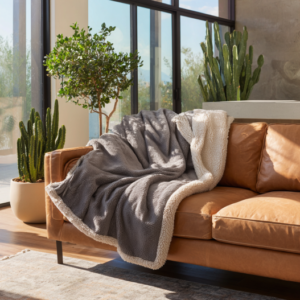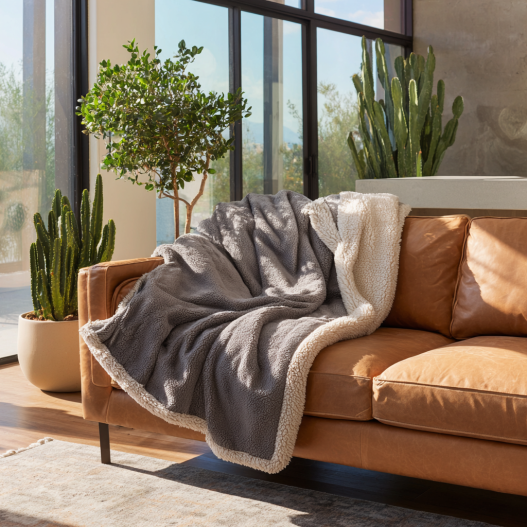Integrating Bedroom Seating: Design Ideas for Comfort & Style
Integrating bedroom seating into your bedroom design creates a cozy and functional retreat. With the right furniture and layout, you can combine comfort, privacy, and style while showcasing personality. For more holistic design inspiration, explore our bedroom seating guide.
Key Takeaways
- Integrating bedroom seating instantly upgrades comfort and function.
- Choose armchairs, ottomans, loveseats, or sofas based on room size.
- Layer ambient, task, and accent lighting for a cozy seating nook.
- Use multifunctional, space-saving furniture for small bedrooms.
- Express personality with textures, colors, and curated accents.
✨ Pro Tips for Integrating Bedroom Seating
- Prioritize comfort first—style comes second.
- Keep clear pathways (30–36 inches) around seating.
- Integrate hidden storage benches or ottomans for clutter-free design.
- Balance proportions—avoid oversized furniture in compact rooms.
Enhancing Comfort and Appeal
When integrating bedroom seating, start with comfort. Pick seating that supports your favorite ways to unwind—whether it’s reading, journaling, or sipping tea. Upholstered armchairs, compact loveseats, or small sofas work well without overwhelming your space.
Imagine curling up in a plush armchair by the window with a book on a rainy afternoon, or stretching out on a loveseat with a morning cup of coffee. The seating you choose should serve your everyday rituals, not just look good in photos. Many homeowners even add a small side table to hold tea, glasses, or bedtime essentials, making the area truly functional.
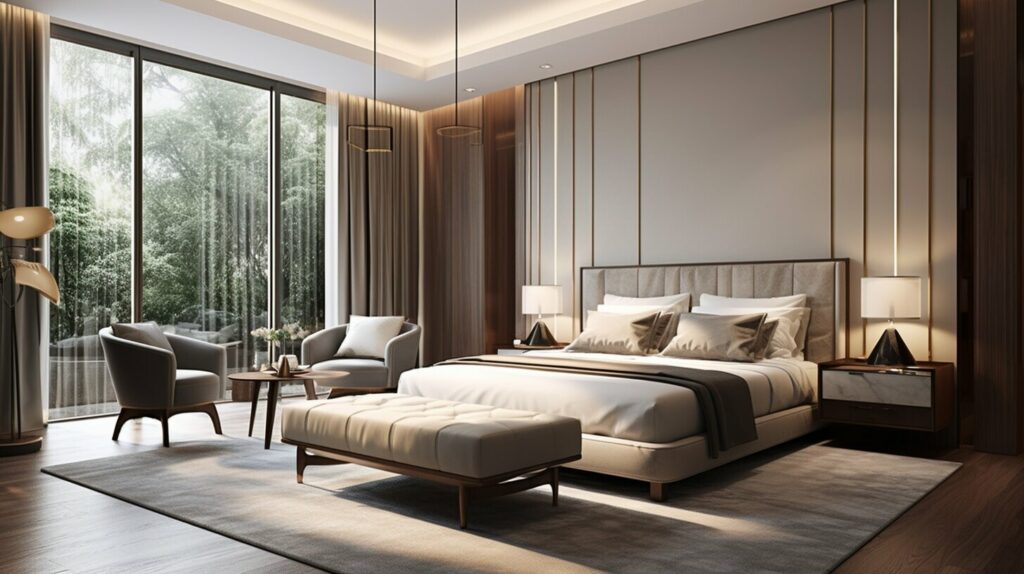
Textured fabrics—bouclé, linen blends, soft chenille—add warmth, while layered lighting creates ambiance. For expert examples, browse Architectural Digest’s seating inspiration.
Design Inspiration
“The right furniture can transform your bedroom seating area into a cozy retreat where you can relax and unwind.”
Bedroom Seating Options at a Glance
| Furniture Options | Description |
|---|---|
| Overstuffed Armchairs | Plush and supportive—ideal for reading or relaxing |
| Ottomans | Footrest + extra seat; many with hidden storage |
| Sofas | Perfect for large bedrooms; adds lounge-style comfort |
| Loveseats | Compact for medium rooms; cozy for two |
Creating an Ambiance
Ambiance matters. Layer lighting, texture, and nature to create a retreat. A mix of ambient lamps, task lights, and accent lighting defines the mood while plants or fresh flowers bring life into the space. For more holistic sleep tips, see our guide on bedroom environments.
Think of your seating nook as a “room within a room.” Position a floor lamp behind an armchair for evening reading, add candles for soft glow, or place a small vase of eucalyptus on a side table to bring calming fragrance. Layered ambiance encourages relaxation and separates the seating area from your sleep zone, which is especially helpful in studio apartments.

Space-Saving Options
Small bedroom? Integrating bedroom seating doesn’t mean clutter. Choose multifunctional pieces like benches, daybeds, and nesting ottomans that serve double duty.
In compact apartments, many people use a slim bench at the foot of the bed for storage and seating. Couples may prefer a loveseat that doubles as a guest sleeper, while students often turn to foldable or stackable ottomans. These choices ensure that no square foot is wasted while still creating comfort zones inside tight layouts.
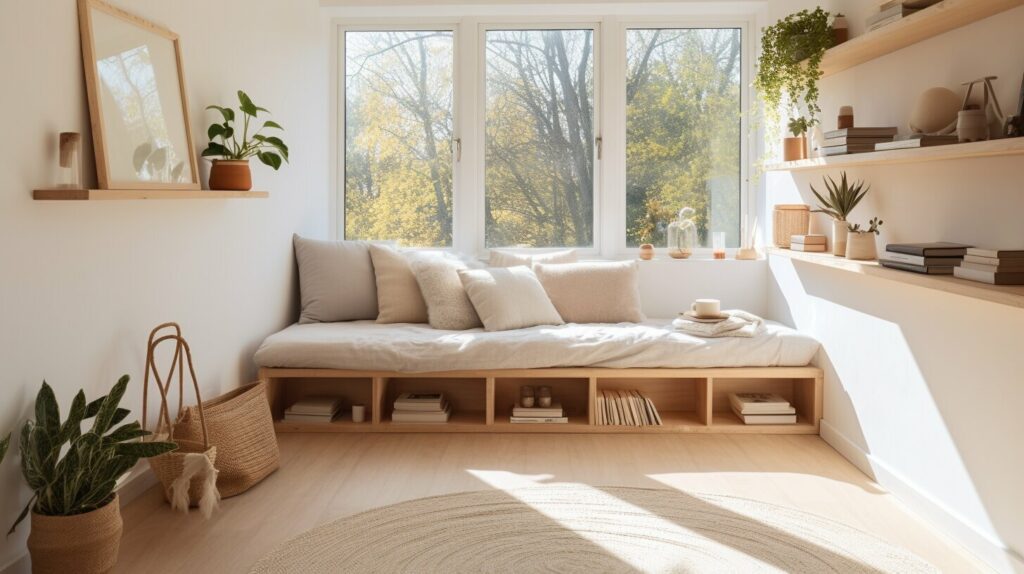
| Space-Saving Option | Benefits |
|---|---|
| Benches | Seat + hidden storage; fits at bed’s foot |
| Daybeds | Sofa by day, guest bed by night |
| Nesting Ottomans | Flexible seating; stackable; storage-friendly |
Placement and Flow
Strategic placement is key when integrating bedroom seating. Position furniture outside main walkways and align with focal points like headboards or windows. For balance and positive energy, explore feng shui elements.
For instance, a chaise lounge angled toward a window creates a natural spot for daydreaming, while a bench at the bed’s end can function as both décor and practical seating. Always allow for clear walkways; a good rule of thumb is at least 30 inches of space for comfortable flow. A cluttered arrangement not only looks cramped but can also disrupt relaxation.
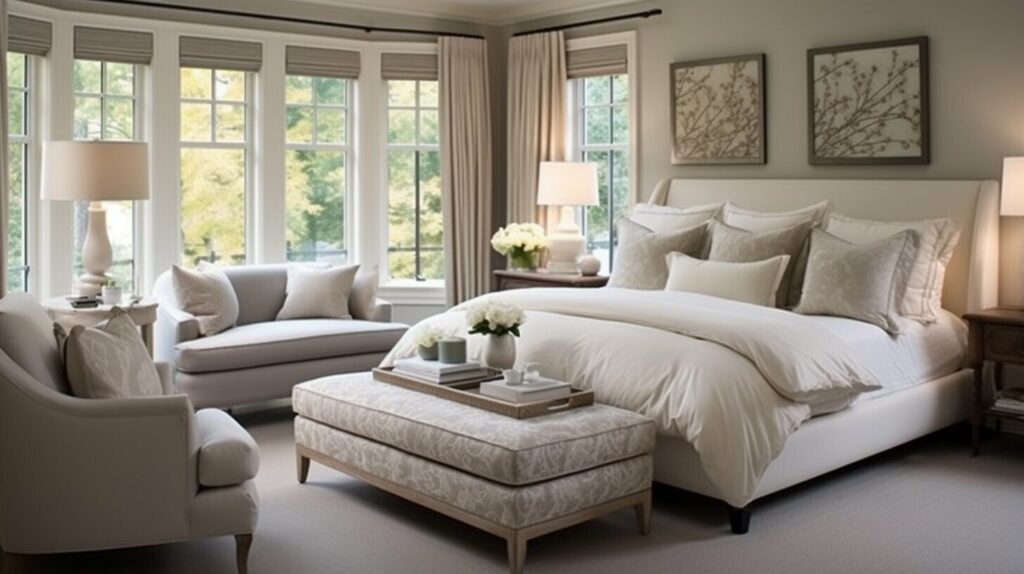
Choosing the Right Furniture
Match furniture scale and texture to your room. Sleek armchairs fit modern rooms, while tufted designs suit classic spaces. Multifunctional pieces, like storage ottomans, ensure both beauty and practicality.
Before purchasing, visualize how the piece will look with your existing décor. A mid-century modern armchair pairs well with light woods, while a velvet loveseat might enhance a romantic or vintage-inspired bedroom. If your bedroom doubles as a work-from-home spot, consider an upholstered chair that transitions seamlessly between desk and reading corner.

Adding Personal Touches
Finish your seating area with personal style—throws, accent pillows, and curated decor. Balance height and texture for a collected look, avoiding clutter.
Try layering a chunky knit throw over an armchair, adding patterned cushions for contrast, or placing a gallery wall above the seating area to showcase personal photos or artwork. Greenery—whether real or faux—introduces softness, while decorative trays keep items like remotes and candles organized. These finishing details make the space feel intentionally styled, not just functional.
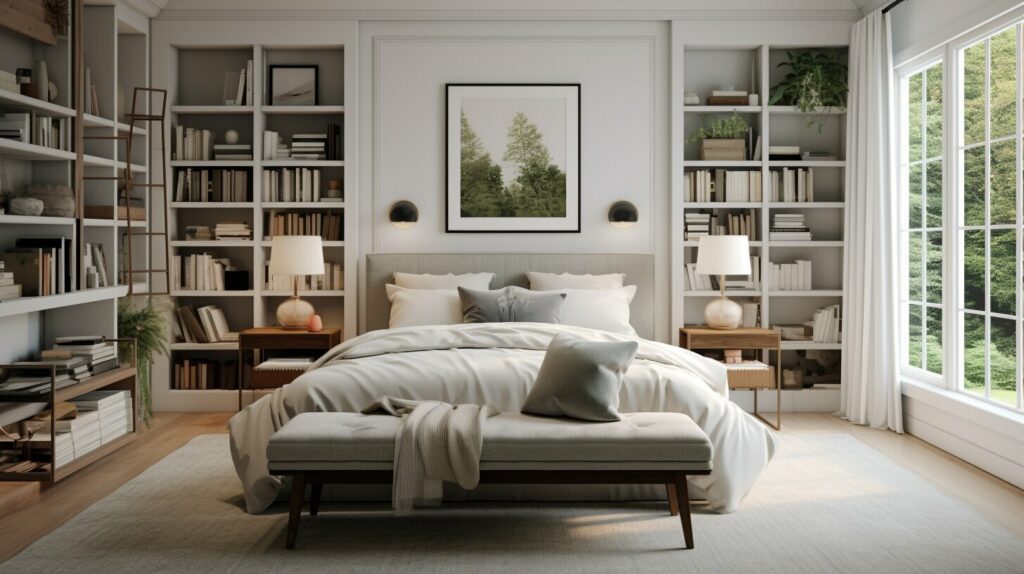
Maximizing Functionality
Integrating bedroom seating works best when furniture earns its keep. Lift-top benches, storage ottomans, and sleeper loveseats keep rooms functional. For more inspiration, see our bedroom accessories guide.
Practicality doesn’t have to mean sacrificing style. Many storage ottomans now come upholstered in designer fabrics, so they double as statement pieces. Sleeper loveseats are especially helpful in guest bedrooms, giving you both daily seating and occasional extra sleeping space. These dual-purpose pieces prevent overcrowding while adding elegance.
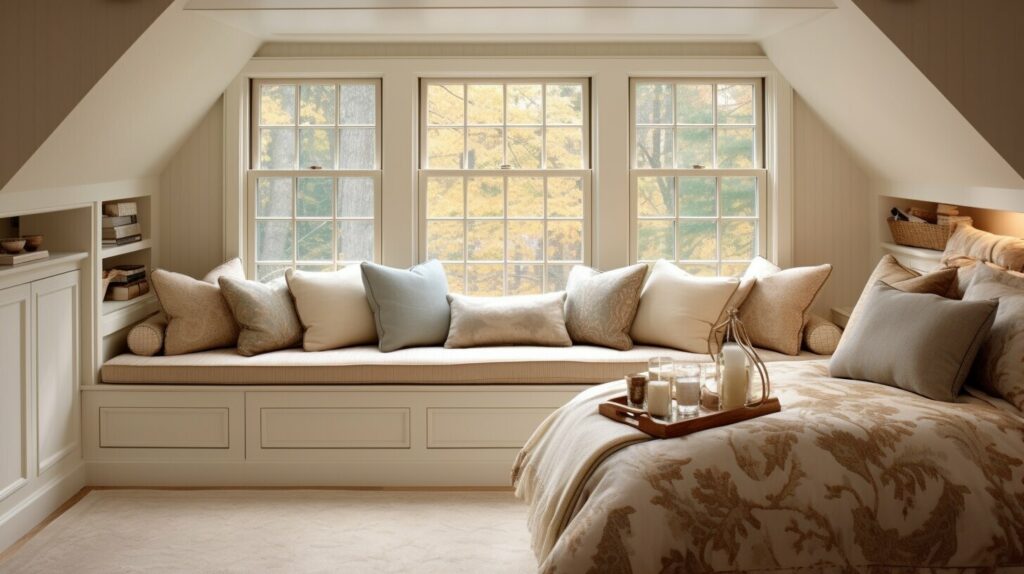
Conclusion
By integrating bedroom seating, you transform your space into a cozy retreat. From armchairs to multifunctional ottomans, the right furniture enhances comfort, flow, and style. With space-saving solutions and curated accents, your bedroom becomes both personal and practical.
🎥 Watch: Bedroom Seating Layout Ideas
See practical examples of integrating bedroom seating with this short design guide:
FAQ
- Can any type of seating furniture be used in a bedroom?
- Yes. From armchairs to daybeds, the key is scaling pieces to fit the room.
- What’s the best placement for bedroom seating?
- Place outside traffic flow and near focal points like a headboard or window.
- How can I maximize space in a small bedroom?
- Use benches with storage, nesting ottomans, or compact loveseats.
- How do I add ambiance?
- Layer ambient, task, and accent lighting plus natural greenery.
- What’s the difference between a loveseat and a small sofa?
- Loveseats are typically built for two people, while small sofas can seat three and often provide deeper lounging comfort.
- Is it worth adding a chaise lounge in a bedroom?
- If space allows, a chaise offers luxurious comfort and creates a statement focal point. It’s ideal for reading, napping, or simply relaxing.
Final Thoughts
At Cozy Bed Quarters, we believe integrating bedroom seating is the ultimate way to blend style and comfort. Start with one well-chosen piece and let it transform your bedroom retreat. Whether you live in a small apartment or a spacious home, the right seating turns your bedroom into a truly personal sanctuary.
Related reading from Cozy Bed Quarters
- Bedroom Chairs & Seating: Options and Layout Tips
- Create the Ideal Bedroom Environment for Better Sleep
- Feng Shui Bedroom Elements for Calm & Balance


